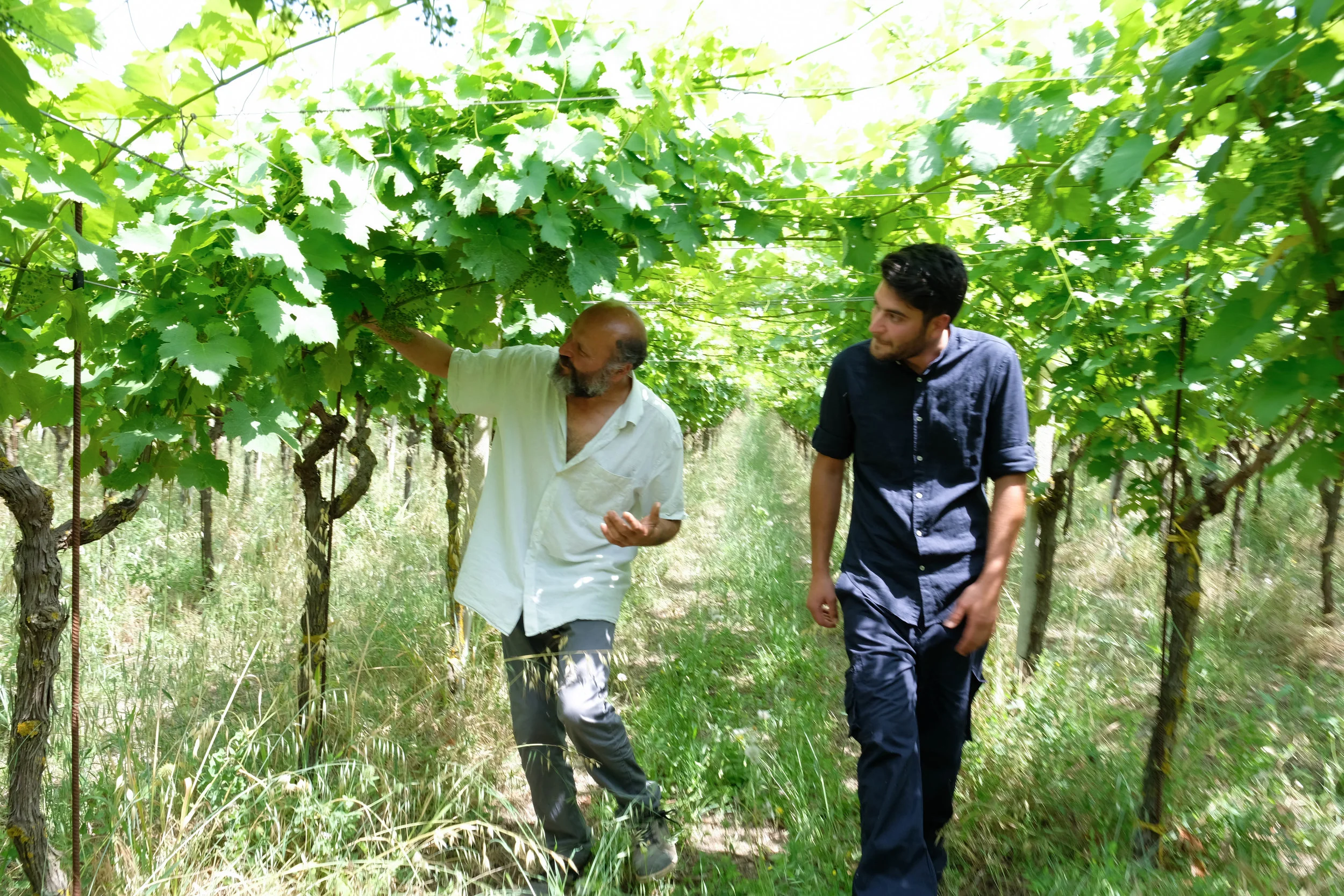l’Archetipo - From Soil to Glass
If you visit the vineyards of l’Archetipo, you will meet Valentino (pictured above and right with son, Domenico). He is the father of the Dibenedetto family and the dedicated farmer behind l’Archetipo, one of the earliest modern wineries to adopt a fully Natural practice in Italy.
If you ask him about the secret to his success - how he is able to avoid commercial wine practices and still support his family with humble farming - he won’t say a word. He will simply reach down into the soil, grab a handful of dark earth teeming with life, and urge you to feel it. It’s both warm and cool. It vibrates with insects and microbes.
It smells clean. It crumbles and feels smooth in your hands.
It is unlike any farming soil on Earth.
20 years ago, l’Archetipo was born from this simple concept: the land is everything. Valentino understood what few did at the time, that soil is the foundation to all life on our beautiful planet.
From the beginning, his vines were grown without a single drop of pesticide or herbicide; his wines were fermented with only native, wild yeasts; and, his final product was bottled without any filtration or tampering.
A pure, organic expression of grape and place.
Most importantly, he put forward a new farming philosophy called agricultura sinergica, Italian for “synergistic agriculture.”
Valentino and his family of five all ascribe to this biodynamic belief that everything is connected. Wind, sun, rain, plants, insects, animals - in short, all the natural elements - are part of a single ecosystem powered by the soil.
This includes us, as humans. In fact, legend has it that the word “human” developed from the word, “humus,” which describes organic matter decomposing into soil.
Which brings us to the foundation of synergistic agriculture, humus. Valentino’s son, Domenico, calls this layer the most important part of the soil. It consists of a complex combination of decomposing organic matter like tree leaves, burrowing insects, and other live bacteria.
In commercial vineyards, this layer can be killed off by chemical sprays and excessive plowing. But in the lush, jungle-like vineyards of l’Archetipo, humus is king. It feeds all the vines with nourishing vitality.
The synergistic approach is considered too risky by Valentino’s commercial counterparts. Chemicals and industrial methods provide certainty, lower risk, and profitability.
How could Valentino scale? How could he maintain profits?
Valentino sees a bigger picture, far greater than business. From the moment he planted his first vine, he was preoccupied with protecting our soils on a global scale. He took his message to the European Parliament, where he spoke on soil health in support of organic and biodynamic farming. Then, he even kickstarted an international campaign to get humus protected status as a UNESCO heritage site.
Most people may not understand the importance of humus because they can’t see it hidden underneath the topsoil.
But, as you walk through the vineyards of l’Archetipo, you can see the results of a healthy humus. Instead of looking down at the soil, look up.
Valentino with son, Domenico
Tall, incredible vines are growing above and around you. There are very few places on earth with more beautiful, vibrant vines than these. They are much like small trees, growing in high arcs as they attempt to get more sunlight. Their leaves are massive, their roots thick, and their grapes full of minerals.
These grapes, born from a complex, completely natural ecosystem, translate magnificent energy and elegance to the wines they create.
And, the Dibenedetto family does not get in the way. In the cellar, they do not filter their wines or use any additives, letting them develop on their own over a few years. The result is wine highlighted by a focused expression of fruit and, more impressively, an intense minerality.
In most wines, minerality comes in the form of soil or rock, a certain earthy quality. In the case of l’Archetipo’s wines, it is much more.
Valentino’s synergistic agriculture creates aromatics that express everything about the wonderful seaside town of Castellaneta, Italy. The salty breeze coming from the Mediterranean Sea, the rich micronutrients in the dark soil, the dried earth quality of the decomposing leaves, the diverse rock composition of the humus, the arid climate of hot days and cool nights - you can actually taste all of these individual elements of minerality in the glass.
From soil to glass, this is l’Archetipo’s greatest contribution to our planet.
Domineco Dibenedetto, l’Archetipo
Todd White, Dry Farm Wines Founder
Valentino Dibenedetto, l’Archetipo
Ramzy Kahhale, Dry Farm Wines, Wine Program
To Valentino, Anna Maria, Carlo Nazareno, Domenico, Andrea, and Maria Clelia: thank you for your incredible dedication to soil every day. We are proud to support your mission of protecting our ecosystem.
With love and gratitude,
The Dry Farm Wines Family.



